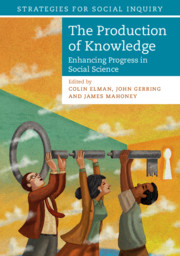Book contents
- The Production of Knowledge
- Strategies for Social Inquiry
- The Production of Knowledge
- Copyright page
- Contents
- Detailed Contents
- Figures
- Tables
- Contributors
- Acknowledgments
- 1 Introduction
- Part I Discovery
- Part II Publishing
- Part III Transparency and Reproducibility
- 6 Transparency and Reproducibility: Conceptualizing the Problem
- 7 Transparency and Reproducibility: Potential Solutions
- 8 Making Research Data Accessible
- 9 Pre-registration and Results-Free Review in Observational and Qualitative Research
- Part IV Appraisal
- Part V Diversity
- Part VI Conclusions
- References
- Index
9 - Pre-registration and Results-Free Review in Observational and Qualitative Research
from Part III - Transparency and Reproducibility
Published online by Cambridge University Press: 11 March 2020
- The Production of Knowledge
- Strategies for Social Inquiry
- The Production of Knowledge
- Copyright page
- Contents
- Detailed Contents
- Figures
- Tables
- Contributors
- Acknowledgments
- 1 Introduction
- Part I Discovery
- Part II Publishing
- Part III Transparency and Reproducibility
- 6 Transparency and Reproducibility: Conceptualizing the Problem
- 7 Transparency and Reproducibility: Potential Solutions
- 8 Making Research Data Accessible
- 9 Pre-registration and Results-Free Review in Observational and Qualitative Research
- Part IV Appraisal
- Part V Diversity
- Part VI Conclusions
- References
- Index
Summary
Amidst rising concern about publication bias, pre-registration and results-blind review have grown rapidly in use. Yet discussion of both the problem of publication bias and of potential solutions has been remarkably narrow in scope: publication bias has been understood largely as a problem afflicting quantitative studies, while pre-registration and results-blind review have been almost exclusively applied to experimental or otherwise prospective research. This chapter examines the potential contributions of pre-registration and results-blind review to qualitative and quantitative retrospective research. First, the chapter provides an empirical assessment of the degree of publication bias in qualitative political science research. Second, it elaborates a general analytic framework for evaluating the feasbility and utility of pre-registration and results-blind review for confirmatory studies. Third, through a review of published studies, the paper demonstrates that much observational—and, especially, qualitative—political science research displays features that would make for credible pre-registration. The paper concludes that pre-registration and results-blind review have the potential to enhance the validity of confirmatory research across a range of empirical methods, while elevating exploratory work by making it harder to disguise discovery as testing.
Keywords
- Type
- Chapter
- Information
- The Production of KnowledgeEnhancing Progress in Social Science, pp. 221 - 264Publisher: Cambridge University PressPrint publication year: 2020
- 17
- Cited by

